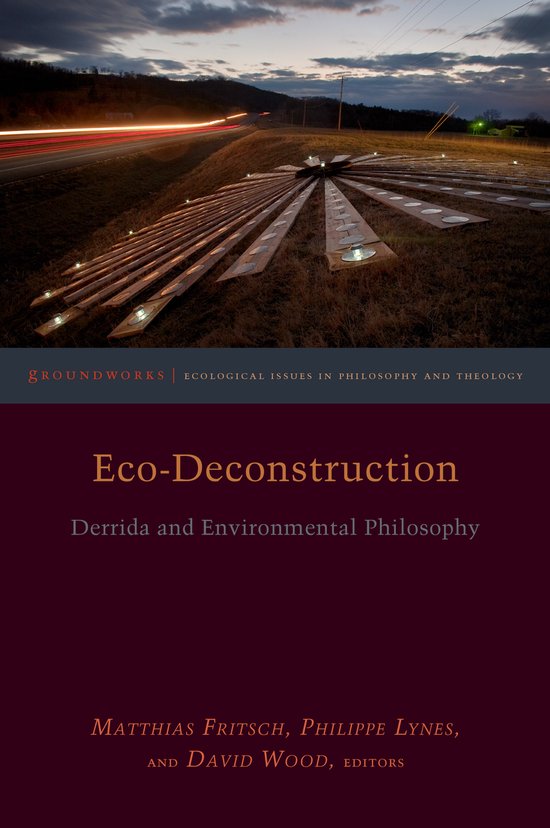Eco deconstruction

1 - 2 weken
“In 1998, Derrida hailed ecology as a 'new dimension of ‘living together.’ Almost twenty years later, ecology is nothing new: It even risks having overtaken itself in the sense of no longer marking any specific domain. It is clear that ecology traverses all spheres of all existences. The eco-deconstruction undertaken in this volume means both an ecology of deconstruction (what is a disseminated oikos? a differing-deferring one? a prosthetic one?) and also a deconstruction of ecology, thus of economy, ecopolitics, ecomythics, and ecosophy.”—Jean-Luc Nancy, University of Strasbourg
“A terrific collection of essays penned by a stellar group of scholars, Eco-Deconstruction definitively demonstrates the continued relevance of deconstruction in our era of ecological disaster. No mere echo chamber of agreement, Eco-Deconstruction likewise shows us where deconstruction can be helpfully supplemented with other approaches going forward into an uncertain ecological future. Essential reading for anyone interested in environmental philosophy.”—Jeffrey Nealon, The Pennsylvania State University
"Timely, original, and extraordinarily innovative. . . . It will be an invaluable reference point for all those interested in the intersection of continental philosophy, literary criticism, posthumanism, and environmental concerns."—Mick Smith, Queens University
Eco-Deconstruction marks a new approach to the destruction of our natural environment. While the work of Jacques Derrida, with its relentless interrogation of the anthropocentric metaphysics of presence, has already proven highly influential in posthumanism and animal studies, the present volume, drawing on published and unpublished work, builds on these insights to address the most pressing environmental issues of our time.
From critiquing our facile understanding of temporality, to exploring an originary environmentality that marks the constitutive ecological embeddedness of mortal life, to examining such remains of human culture as nuclear waste, to articulating an ecological demand for justice, Eco-Deconstruction will resonate with readers not only of philosophy, but across the humanities and the social and natural sciences.
Contributors: Karen Barad, Timothy Clark, Claire Colebrook, Matthias Fritsch, Vicki Kirby, John Llewelyn, Philippe Lynes, Michael Marder, Dawne McCance, Michael Naas, Kelly Oliver, Michael Peterson, Ted Toadvine, Cary Wolfe, David Wood
Matthias Fritsch is Professor of Philosophy at Concordia University, Montréal. Philippe Lynes is Fulbright Canada Visiting Research Chair in Environmental Humanities at the University of California, Irvine. David Wood is W. Alton Jones Professor of Philosophy at Vanderbilt University.
Eco-Deconstruction marks a new approach to the degradation of the natural environment, including habitat loss, species extinction, and climate change. While the work of French philosopher Jacques Derrida (1930–2004), with its relentless interrogation of the anthropocentric metaphysics of presence, has already proven highly influential in posthumanism and animal studies, the present volume, drawing on published and unpublished work by Derrida and others, builds on these insights to address the most pressing environmental issues of our time.
The volume brings together fifteen prominent scholars, from a wide variety of related fields, including eco-phenomenology, eco-hermeneutics, new materialism, posthumanism, animal studies, vegetal philosophy, science and technology studies, environmental humanities, eco-criticism, earth art and aesthetics, and analytic environmental ethics. Overall, eco-deconstruction offers an account of differential relationality explored in a non-totalizable ecological context that addresses our times in both an ontological and a normative register.
The book is divided into four sections. “Diagnosing the Present” suggests that our times are marked by a facile, flattened-out understanding of time and thus in need of deconstructive dispositions. “Ecologies” mobilizes the spectral ontology of deconstruction to argue for an originary environmentality, the constitutive ecological embeddedness of mortal life. “Nuclear and Other Biodegradabilities,” examines remains, including such by-products and disintegrations of human culture as nuclear waste, environmental destruction, and species extinctions. “Environmental Ethics” seeks to uncover a demand for justice, including human responsibility for suffering beings, that emerges precisely as a response to original differentiation and the mortality and unmasterable alterity it installs in living beings. As such, the book will resonate with readers not only of philosophy, but across the humanities and the social and natural sciences.
- 1 Bekijk alle specificaties
